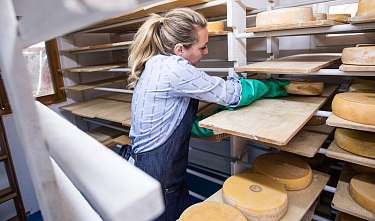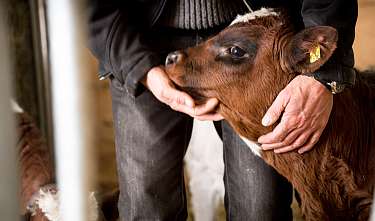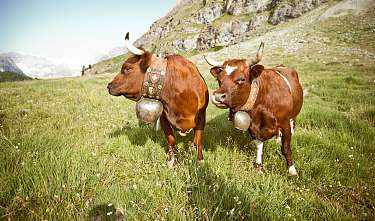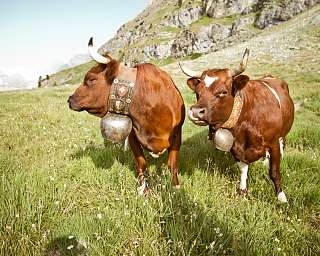The Cows
In 2014, one of Zermatt’s biggest dairy farmers announced that he would be giving up his herd – the Eringer cows, which was being faced by extinction. When Paul Julen heard this it was clear: This would have been a serious blow for the local dairy, which relies on local milk to make the famous Zermatter cheese. The local dairy just couldn’t be shut down. „The idea of producing our own Tradition Julen cheese for raclettes in the restaurant Schäferstube began to take shape – this was the ideal opportunity.“ And so this shepherd and man of action bought cows.
„I am still much more a shepherd“ says Paul Julen, but the twinkle in his eyes show that the cows have also found a place in his heart. When he pats them they really seem to enjoy it, which wasn’t the case at the beginning. „The hair on their coats used to stand up when I came near them. It is really nice to see that they enjoy me patting them now. Even their expressions are much different now and they also give more milk. Yes, it’s true – I have really come to enjoy working with my cows“, he admits. „I think they are just beautiful to look at – especially when they are outdoors in their paddocks.“
Special animal, special cheese
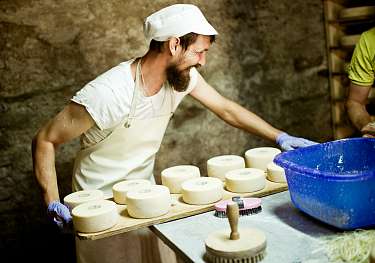
The total yield of all the Julen cows is enough to produce 1.5 tons of mountain cheese – the very cheese that graces the breakfast buffets of the Tradition Julen hotels. During the winter some of the cheese is processed in the “Horu Käserei” in Zermatt to make delicious raclette cheese which guests can enjoy in the restaurant Schäferstube. „Our very own raclette cheese is extremely popular. No wonder: everything that the cows eat is local. The pastures at 1,600 metres are full of juicy alpine flowers and herbs which give the cheese a special note“, says Paul Julen proudly.
The cows are up on the alpine pastures from June to September. The brown cows and the red Holsteiners spend the summer at Roli Ammann‘s fathers alp while the Evoleners graze the pastures at the foot of the Matterhorn. They are extremely robust, sure-footed and well suited to the alpine conditions. Their high-spirited nature means that battles are often carried out among themselves, but they are very placid and gentle towards humans.
Paul Julen visits his Evoleners once a week during summer, bringing them salt and bread. He enjoys the sight of them out grazing in the alpine pastures – the best place to observe them and his sheep. These are the moments when a shepherd’s heart beats just a little bit louder for his cows.
